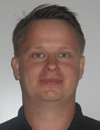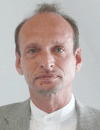08:00 | Registration |
|
PCR and NGS Expression Profiling |
| |
09:00 |  | Keynote Presentation Quantitative PCR Analysis of DNA, RNAs, and Proteins in the Same Single Cell
Anders Stahlberg, Senior Scientist, University of Gothenberg, Sweden
In this presentation we will demonstrate how DNA, RNAs, and Proteins can be analyzed in the same single cell. Multi-parametric correlation studies at single cell level open up new possibilities to understand dynamic biological processes with refined resolution. |
|
10:00 | Quantitative Analysis of Single-Cell Transcriptomes
Sten Linnarsson, Assistant Professor, Karolinska Institutet, Sweden
Using molecular labels to nearly eliminate PCR amplification bias and obtain absolute molecule counts by sequencing will be discussed. |
10:30 | Coffee Break and Networking in the Exhibition Hall |
11:15 | Taking Expression Profiling to New Dimensions
Mikael Kubista, Professor/Founder, TATAA Biocenter AB, Sweden
This presentation will describe single cell expression profiling of astrocytes responding to brain damage in mouse model. |
11:45 | Single-cell Gene Expression During Mouse Early Development
Rickard Sandberg, Scientist/Principal Investigator/Researcher, Karolinska Institutet, Sweden
In this talk I will present our current applications of Smart-Seq to mouse embryonic development. I will also stress how useful this protocol will be for addressing fundamental biological problems requiring genome-wide transcriptome profiling in individual cells. |
12:15 | Lunch Break and Networking in Exhibition Hall |
13:30 | Poster Viewing Session |
|
Microfluidics, Microarrays and Chips |
| |
14:15 | Catch it and Batch it: Picoliter Cultivation at the Single Cell Level
Dietrich Kohlheyer, Group Leader, Forschungszentrum Juelich GmbH, Germany
The talk covers the fabrication and successful utilization of microfluidic devices for the analysis of industrially relevant microbial strains. Micrometre sized chambers are used to capture single mother cells allowing the spatiotemporal analysis of isogenic microcolonies by automated time lapse microscopy. Genetically encoded fluorescence reporters give direct information on e.g. stress response and productivity. |
14:45 | Probing Single Stem Cell Behavior in Microarrayed Artificial Niches
Matthias Lutolf, Head, Ecole Polytechnique Federale de Lausanne, Switzerland
This presentation will discuss novel microengineered in vitro platforms to decipher the complex crosstalk between stem cells and their microenvironment at single cell level and in high-throughput. |
15:15 | Coffee Break and Networking in the Exhibition Hall |
16:00 | Natural Killer Cell Immune Surveillance Studied at the Single Cell Level
Bjorn Onfelt, Associate Professor, Karolinska Institute, Sweden
Each individual has a heterogeneous pool of natural killer (NK) cells consisting of cells with varying ability to kill virus-infected or tumor cells. Here, this heterogeneity is dissected by studying NK cell migration dynamics and cytotoxic response at the single cell level. |
16:30 | How Cells Recognize and Remodel Their Micro-niches
Viola Vogel, Professor, ETH Zurich, Switzerland
Cells sense and remodel their environment by applying by pulling on their substrates. As they apply tensile forces, all proteins that are part of force-bearing junctions get mechanically stretched. We are particularly interested in deciphering how proteins can act as mechano-chemical signaling switches and thereby enable mechanotransduction processes. |
17:00 | Emerging Opportunities in Single Cell Analysis [SCA]—Qualitative and Quantitative Market Analysis and Competitive Environment
Enal Razvi, Managing Director, Select Biosciences Inc, United States of America
In this presentation, Select Biosciences will frame the various market segments in the broader SCA space, and provide a snapshot of our market analysis addressing the structure of these segments. CTC analysis is one segment where emphasis is placed as this segment is positioned at the crossroads of research and clinical application. |
17:45 | Round Table Discussions in the Exhibition Hall |

